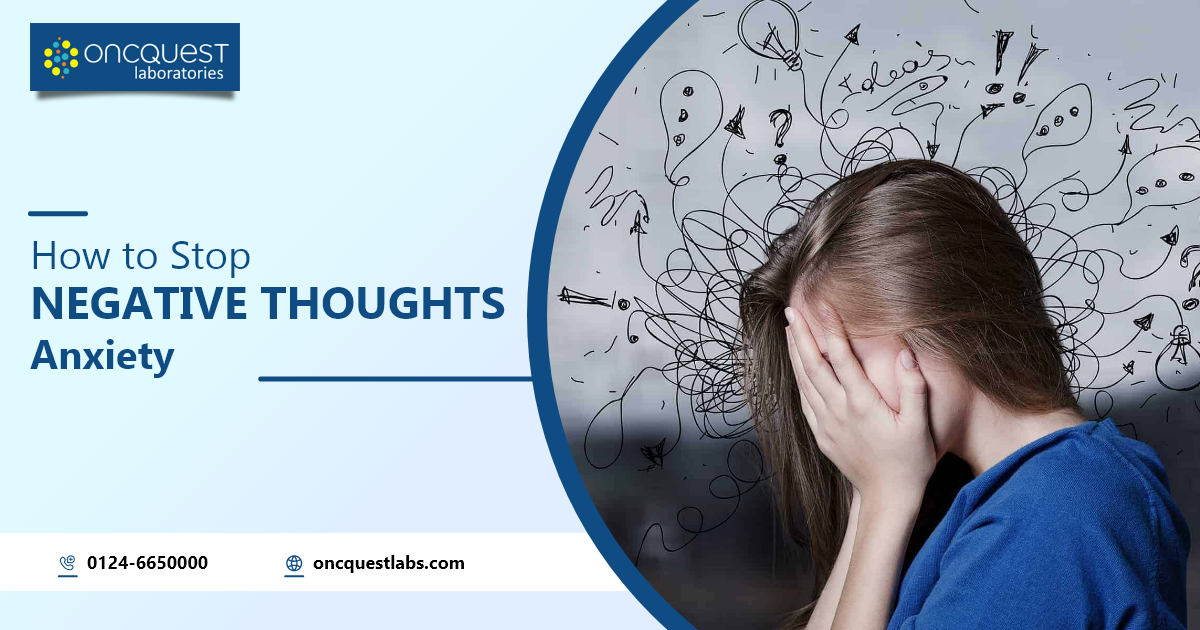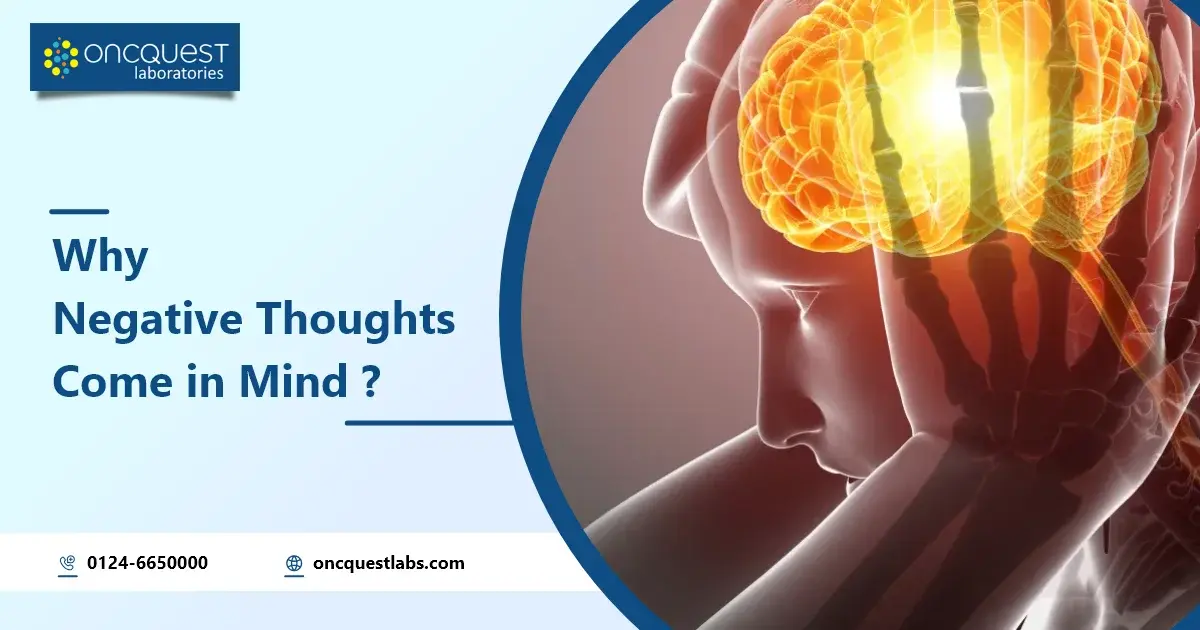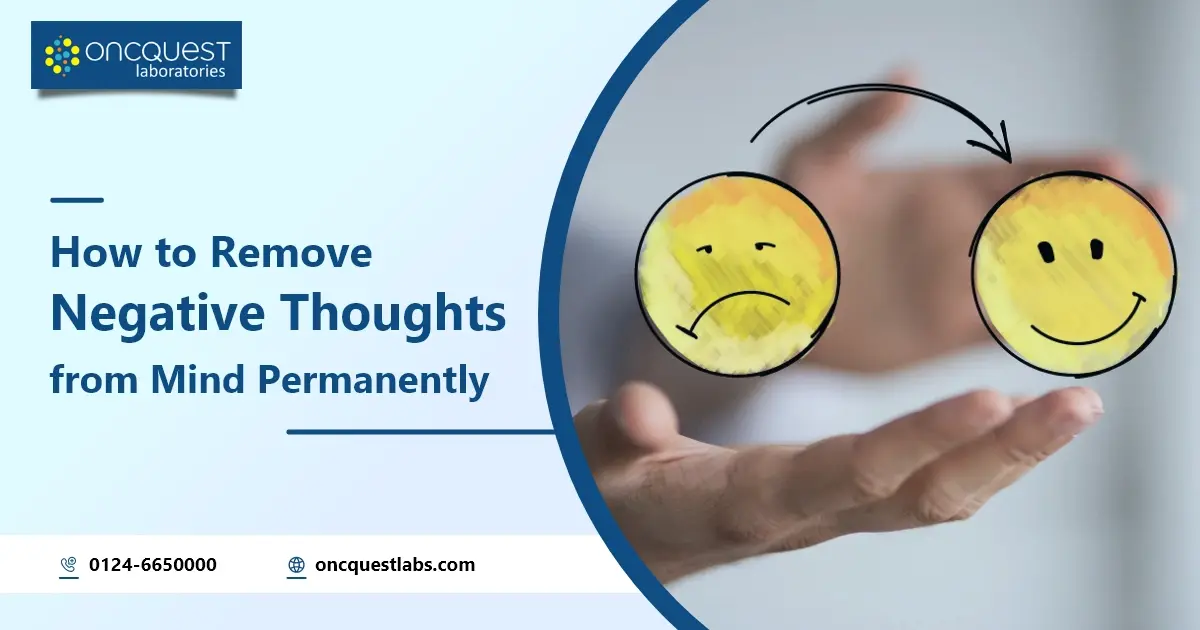Negative thoughts anxiety, the relentless stream of pessimistic and worrisome thoughts, can be a formidable adversary in the battle for peace of mind. Its impact on our mental well-being is profound, often leaving us trapped in a cycle of self-doubt and unease. However, it’s essential to recognize that we have the power to regain control over our thoughts and emotions. In this blog, we will explore practical strategies that can help you conquer negative thoughts anxiety and usher in a renewed sense of inner peace. By understanding its effects and learning to manage these thoughts, you can take significant steps towards a more positive and harmonious state of mind.
Contents
How to identify negative thoughts anxiety
Negative thoughts anxiety can feel like a never-ending storm of worrisome and unhappy thoughts swirling in your mind. It’s when you keep thinking about things that make you feel anxious or sad, and these thoughts just won’t leave you alone. These thoughts often make you question yourself, doubt your abilities, and worry about the past or the future. Imagine it like a dark cloud hanging over your head, making you feel stressed and uneasy.
This anxiety can show up in different ways. You might find yourself overthinking things, like replaying a past mistake over and over in your head or worrying too much about what might happen in the future. It can also make you feel like you’re not good enough, leading to self-criticism and low self-esteem. Sometimes, you start thinking about the worst possible things that could happen, even if they’re not likely. Your body might react too, with a faster heartbeat or tense muscles, and you might avoid situations or people that make you feel this way.
Negative thoughts often have specific triggers. These triggers can include big life changes, like losing a job or going through a breakup. If you’re always trying to be perfect and never make a mistake, that can lead to negative thoughts too. Sometimes, past difficult experiences or comparing yourself to others can bring on these anxious thoughts. Uncertainty, not knowing what’s going to happen, can also make those negative thoughts pop up.
Recognizing negative thoughts is like turning on a light in a dark room. It helps you see what’s going on in your mind and how it affects you. When you know you’re having these thoughts, you’re in a better position to do something about them. It’s like having the power to stop them from getting worse and making you feel even more anxious. So, understanding what negative thoughts anxiety is, how it shows up, and what triggers it is the first step toward feeling better and more in control of your thoughts and emotions.
How to avoid negative thoughts
Avoiding negative thoughts entirely may not be realistic, as they are a natural part of human thinking. However, you can manage and reduce negative thoughts by adopting the following strategies:
1. Mindfulness and Awareness: Pay attention to your thoughts and become aware of when negative thoughts arise. Mindfulness techniques can help you observe your thoughts without judgement.
2. Challenge Negative thoughts: When negative thoughts surface, question their validity. Are they based on facts, or are they irrational beliefs? Challenge them and replace them with more balanced perspectives.
3. Positive Affirmations: Use positive affirmations to counteract negative self-talk. Repeat positive statements about yourself and your abilities regularly.
4. Cognitive Behavioral Therapy (CBT): Consider CBT, a therapeutic approach that helps individuals identify and change negative thoughts patterns.
5. Limit Exposure to Triggers: Recognize situations, people, or activities that consistently lead to negative thoughts and try to minimise your exposure to them.
6. Surround Yourself with Positivity: Spend time with supportive and positive people who can influence your mindset.
7. Practice Gratitude: Focus on the things you’re grateful for in your life. Regularly writing in a gratitude journal can help shift your focus to the positive aspects of life.
8. Engage in Relaxation Techniques: Activities like yoga, meditation, and deep breathing exercises can help reduce stress and anxiety, which often contribute to negative thinking.
9. Maintain a Healthy Lifestyle: Regular exercise, a balanced diet, and adequate sleep can have a significant impact on your mental well-being.
10. Seek Professional Help: If negative thoughts are severely affecting your life, consider consulting a therapist or counsellor for guidance and support.
Remember that it’s normal to have occasional negative thoughts, but the goal is not to eliminate them entirely. Instead, aim to manage and reframe them to create a more positive and constructive mindset.
How to replace negative thoughts
Replacing negative thoughts means changing bad or sad ideas in your mind into good and happy ones. First, notice when these bad thoughts come up. Then, ask yourself if they are really true or if you’re just guessing. You can also say nice things to yourself like “I can do it.” Being in the present moment can help, and it’s good to be around people who make you feel good. Exercise, sleep, and eating well can also make your thoughts better. If it’s really hard, you can talk to a special person who knows how to help with thoughts. It might also help to write down your bad thoughts and then write better ones next to them. This way, you can practise making your thoughts more positive. It might take time, but it’s possible to make your thoughts happier.
Seeking Support
Getting help from professionals when you’re feeling really anxious or having a tough time is super important. These experts, like therapists and counsellors, know a lot about anxiety and how to make it better. They have special knowledge and skills to help you in the right way. Plus, they give you a safe and secret place to talk about your feelings without any worry. They also teach you cool tricks to handle anxiety, which can work better than trying on your own.
Therapists and counsellors have specific jobs in managing anxiety. First, they figure out how much anxiety you have and what kind it is. Then, they chat with you and help you understand why you feel anxious. They also show you useful skills like how to take deep breaths, change your thoughts, and stay calm. Sometimes, they might talk about medicines with you if needed. They keep an eye on how you’re doing and change the plan if it’s not working.
If you want to find a therapist or counsellor, you can ask your regular doctor for suggestions. You can also look online for local ones or see if your health insurance covers it. Reading what other people say about a therapist can be helpful, and you can have a first chat to see if you feel comfortable with them. You can even ask your friends, family, or groups for recommendations. Remember, asking for help when you’re anxious is a strong thing to do, and it can make your life better.
Maintaining a Healthy Lifestyle to avoid negative thoughts
Impact of Exercise, Diet, and Sleep on Mental Well-Being:
– Exercise: Regular physical activity can have a big impact on mental well-being. It releases feel-good chemicals in the brain like endorphins, which reduce stress and boost your mood. It also helps you sleep better, which is essential for good mental health.
– Diet: Eating a balanced and nutritious diet can provide your brain with the right fuel. Certain foods, like those rich in omega-3 fatty acids and antioxidants, can support brain health and reduce the risk of mood disorders.
– Sleep: Getting enough quality sleep is crucial for mental well-being. Sleep helps your brain recharge and process emotions. When you’re sleep-deprived, it can lead to increased anxiety and stress.
Practical Tips for Maintaining a Healthy Lifestyle:
– Exercise Regularly: Aim for at least 30 minutes of physical activity most days of the week. Find activities you enjoy, like walking, dancing, or biking, to make it fun.
– Eat Well: Include a variety of fruits, vegetables, whole grains, lean proteins, and healthy fats in your diet. Limit sugary and processed foods.
– Get Adequate Sleep: Create a sleep routine and aim for 7-9 hours of sleep per night. Keep a consistent sleep schedule, and make your sleep environment comfortable.
– Manage Stress: Practise stress-reduction techniques like deep breathing, meditation, or yoga to keep anxiety in check.
– Stay Hydrated: Drink enough water throughout the day. Dehydration can affect your mood and cognitive function.
– Limit Alcohol and Caffeine: Excessive alcohol and caffeine can disrupt sleep and increase anxiety. Moderation is key.
– Social Connections: Maintain strong social connections, as having a support network can positively impact mental well-being.
Connection Between Physical Health and Anxiety Reduction:
Your physical health and mental health are closely linked. When you take care of your body through exercise, a healthy diet, and proper sleep, your brain functions better. This, in turn, can reduce the risk of anxiety and other mental health issues. Exercise, for example, releases chemicals in the brain that can reduce anxiety, while sleep allows your brain to process and manage stress more effectively. A healthy lifestyle can act as a buffer against anxiety and contribute to a more positive overall well-being.
Limiting Exposure to Triggers
Sometimes, things make us feel really anxious or worried. These things are called triggers. Common triggers can be when you have lots of work or exams, when you keep saying bad things about yourself, when you see too much sad news, or when you feel scared in social situations. If you’ve had bad things happen in the past, those memories can also be triggers. To make it better, you can learn how to manage stress, be kind to yourself, limit how much sad news you see, set boundaries in social situations, and even talk to someone who can help if you’ve had bad experiences. It’s important to be in a place that’s happy and calm because it can help you handle these triggers better. It reduces daily stress, supports your brain and body, and helps you learn new ways to deal with tough situations. It’s like having a safe and cosy place to feel better.
Conclusion
In conclusion, we’ve learned that addressing negative thoughts anxiety involves recognizing common triggers like stress, negative self-talk, or past traumas. It’s crucial to take steps to limit exposure to these triggers and create a positive, anxiety-free environment. Remember, this is a gradual process; don’t rush. Be patient with yourself and seek professional help when needed. With time, self-compassion, and a supportive environment, you can build a more positive and anxiety-free mindset for a happier, healthier life.
Frequently asked Questions
Q1: Can anxiety cause negative thoughts?
A1: Yes, Anxiety can both be a result of and lead to negative thoughts patterns. Worrying is a prevalent symptom in various anxiety disorders. Conditions such as obsessive-compulsive disorder can originate from intrusive thoughts. In this discussion, we’ll explore various techniques to alleviate distressing thoughts.
Q2: How do I stop negative thinking and anxiety?
A2: To reduce negative thinking and anxiety, try mindfulness techniques like deep breathing or meditation. Challenge and reframe negative thoughts, and consider seeking professional help, such as therapy, to address underlying causes.
Q3: How can I permanently remove negative thoughts from my mind?
A3: Permanently eliminating negative thoughts is challenging, but you can manage them effectively. Practice mindfulness and cognitive-behavioural techniques to recognize and reframe these thoughts. Consistency, self-compassion, and seeking professional guidance when needed can make a significant difference in your journey to minimise persistent negativity.





